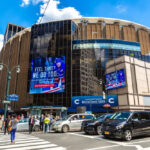New York bill seeks to control prediction market wagering

New York Assemblyman Clyde Vanel has introduced a bill to “crack down” on prediction market wagering.
According to CNY Central, the Oversight and Regulation of Activity for Contracts Linked to Events Act, or ORACLE, would ban predictions on various categories “that are contrary to public policy.”
Prediction markets like Kalshi and Polymarket have been exploding in popularity despite many in the gambling industry seeing their business models as exploiting a loophole that allows them to circumvent state gambling laws.
Billions of dollars are reported to have been wagered on such platforms during the recent New York City mayoral election.
However, states are now fighting back, with Massachusetts suing Kalshi and now New York attempting to introduce new regulations.
Commenting on the proposed legislation, Vanel said, “What this legislation does is, number one, it prevents certain types of events to be used on this platform. Number two, for event contracts that touch regulated betting activities in New York. These platforms have to abide by the same regulations and safeguards that the other betting platforms have to do in New York State.”
New York’s 2025 legislative session is over, meaning this bill cannot be acted on until the 2026 session opens on January 7.
Abi Bray brings strong researching skills to the forefront of all of her writing, whether it’s the newest slots, industry trends or the ever changing legislation across the U.S, Asia and Australia, she maintains a keen eye for detail and a passion for reporting.
Verticals:
Sectors:
Topics:
Dig Deeper
The Backstory
Why New York is eyeing a tighter leash
New York’s latest push to police prediction markets follows a year of fast expansion, cross-agency turf fights and high-profile partnerships that have blurred the line between regulated finance and gambling. The proposed ORACLE Act would wall off categories the state deems contrary to public policy and pull event contracts that touch regulated betting into New York’s existing safeguards. That approach reflects a growing view among state regulators that prediction platforms have used a legal gray area to scale without the consumer protections applied to sportsbooks.
The tension is not happening in a vacuum. Platforms that style their products as event-based derivatives have pressed their case in Washington while building brand equity through mainstream tie-ups. At the same time, states with mature sports wagering regimes are tightening loss controls and advertising rules. The result is a patchwork of policy responses converging on the same question: when does a trade on an outcome become a bet, and who gets to decide?
A federal-versus-state battle moves to court
The legal frontline has been widening. In New York, Kalshi sued the state’s gaming regulator, arguing that the Commodity Futures Trading Commission has exclusive authority over its market for event contracts and that state enforcement is an overreach into federally supervised financial products. The complaint, filed in federal court, frames the issue as a conflict between financial regulation and gambling law. It is the latest in a series of standoffs after similar scrutiny in New Jersey and Nevada’s clarification that it views sports event contracts as wagers that require a state license. Read more in our coverage of Kalshi’s lawsuit against New York regulators.
The stakes of that suit extend beyond one platform. A judgment affirming federal primacy could embolden prediction markets to expand product sets without state gaming approvals, while a loss could cement a state-by-state licensing model that looks more like sports betting. Either outcome will reverberate across companies straddling fintech and wagering as they design new contracts tied to sports, politics and real-world events.
Washington’s slow, deliberate lane-building
Amid the litigation, some firms are seeking to formalize federal oversight pathways. ProphetX has asked the CFTC to grant it status as both a designated contract market and a derivatives clearing organization, a dual registration that would make it the first U.S. exchange and clearinghouse built for sports outcome contracts under CFTC supervision. The company’s filing includes a request-for-quote parlay mechanism modeled on institutional trading protocols, a bid to legitimize multi-leg exposure and price discovery inside an existing financial rulebook. The regulator’s review is expected to stretch into 2026. See details in our piece on ProphetX’s CFTC application for a sports prediction market.
That process is unfolding as federal leadership evolves. The administration has nominated attorney and crypto adviser Michael Selig to chair the CFTC, a move that could shape the commission’s stance on event contracts and tokenized market infrastructure. For New York lawmakers contemplating how to supervise prediction markets that touch their sports ecosystem, the timing is awkward: the state wants immediate guardrails while the federal lane is not yet paved.
Growth, partnerships and the optics problem
Regulatory urgency is being fueled by a visible surge in user activity and headline alliances. Polymarket’s brand has broken out of crypto circles with deals that pull prediction data into mainstream channels. The platform inked a multi-year agreement with the NHL, gaining access to league data, and later became the official prediction market partner of X, pledging product integrations that meld real-time probabilities with social signals. The company says users placed more than $8 billion in predictions in 2024 across politics, culture and entertainment.
For state officials, that momentum complicates the messaging around consumer protection. Partnerships with professional leagues and social media amplify prediction markets’ reach and normalize their products for casual audiences. The optics can collide with responsible gambling goals when retail users encounter event contracts alongside sports scores and trending topics, particularly if platforms operate without the same affordability checks, deposit caps and ad curfews imposed on sportsbooks.
States tighten guardrails while markets converge
New York is not just debating what counts as a bet; it is also reassessing limits on wagering behavior. A separate bill by Assemblyman Robert Carroll would set a daily betting cap of $5,000 per person, restrict deposits and curb daytime advertising. Proponents say those measures track a market that grew 18% year over year and generated more than $1 billion in revenue in 2024; critics warn high rollers will flee to nearby states, eroding tax receipts. The proposal is under review by the Racing and Wagering Committee. For specifics, see our report on New York’s bid to impose daily sports betting limits.
Other states are answering different structural questions. In Wisconsin, lawmakers advanced a “hub-and-spoke” model to legalize mobile wagering statewide by routing bets through servers on tribal land, an approach validated in Florida by a federal appellate court. The effort coincides with a lawsuit by the Ho-Chunk Nation arguing that companies such as Kalshi and Robinhood are operating illegal gambling platforms in the state. The dispute underscores how quickly fintech, social trading and sports betting are overlapping. Read more about Wisconsin’s statewide online sports betting proposal.
The policy through line: clarity and parity
Against this backdrop, New York’s ORACLE framework aims to establish two principles. First, exclude categories of outcomes that lawmakers consider outside the bounds of public interest, a response to concerns over contracts on sensitive events. Second, require that event contracts intersecting with regulated sports betting adhere to the same rules on integrity, advertising and consumer protections as licensed books.
Whether that becomes the template depends on developments on multiple fronts. If the CFTC clears a federally supervised venue for sports event contracts, it could pressure states to coordinate rather than ban. If courts side with state gaming commissions, prediction markets may face a licensing map that mirrors sportsbooks, with compliance burdens and slower product rollout. In the meantime, platform partnerships with leagues and social networks will keep drawing users, sharpening the stakes for policymakers trying to balance innovation with guardrails.
For New York, the legislative calendar ensures the debate will spill into 2026. That runway gives lawmakers time to absorb federal signals, court outcomes and the real-world impact of other states’ experiments. But the market will not wait. The more event contracts are embedded in everyday apps and sports content, the harder it becomes to police them as niche financial instruments rather than mass-market wagers. That is the collision the ORACLE bill tries to preempt.







